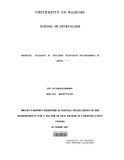| dc.description.abstract | The main aim of this study was to establish the role of parental guidance in children TV programming in order to inform and shape television programming policy and provision of programmes that cater for the needs of children and the young people in Kenya.
Specifically, the study sought to determine the kind of viewer-ship children are being exposed to, thus affect, how children television programs are determined. To determine important factors that influence and inform local producers and policy makers about the children TV programming. It also sought to determine how different cultures, economies and policy environments shape children's television programmes provision and opportunity, and in regard to all this to establish the role of possibly, parental guidance in children TV programming.
Parental guidance on television programming on child protection and the media presents a challenge on not only organizational but also cultural grounds. This is because it concerns a highly sensitive topic involving, as it is 'hidden' value judgment about
different cultures or aspects of them as regards what harmful to a child.
Views on the protection of minors against harmful television content, along with the concepts of childhood and adolescence that this implies, touch upon questions of cultural, national and even personal identity. As long as the focus remains fixed on parental guidance organization issues, however, the ethnocentric content of such views remain partially concealed.
The study indicates that, while harmful and offensive material is, in principle, distinguished from that which is illegal (obscenity, child abuse images etc) it is not easy to define the boundaries in a robust and consensual fashion.
Parental guidance on children TV programmmg, and more relevantly, parents, can mediate children's television rise with the aim of reinforcing desirable and counteracting undesirable influences of television content.
The study found that often conflicting concerns over possible harm against other concerns, most notably civil liberties and freedom of speech, economic competition, children's rights to exploration and privacy, ties with and therefore requires parents capacities or otherwise to regulate their children's media use. | en |

